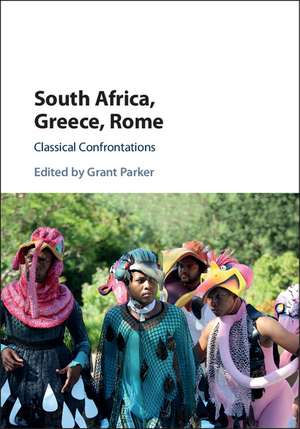South Africa, Greece, Rome: Classical Confrontations
Editat de Grant Parkeren Limba Engleză Hardback – 30 aug 2017
Preț: 765.22 lei
Preț vechi: 946.11 lei
-19% Nou
Puncte Express: 1148
Preț estimativ în valută:
146.42€ • 153.29$ • 121.16£
146.42€ • 153.29$ • 121.16£
Carte indisponibilă temporar
Doresc să fiu notificat când acest titlu va fi disponibil:
Se trimite...
Preluare comenzi: 021 569.72.76
Specificații
ISBN-13: 9781107100817
ISBN-10: 110710081X
Pagini: 566
Ilustrații: 162 b/w illus. 3 tables
Dimensiuni: 180 x 252 x 30 mm
Greutate: 1.32 kg
Editura: Cambridge University Press
Colecția Cambridge University Press
Locul publicării:New York, United States
ISBN-10: 110710081X
Pagini: 566
Ilustrații: 162 b/w illus. 3 tables
Dimensiuni: 180 x 252 x 30 mm
Greutate: 1.32 kg
Editura: Cambridge University Press
Colecția Cambridge University Press
Locul publicării:New York, United States
Cuprins
1. The Azanian Muse: classicism in unexpected places Grant Parker; Part I. Conceiving Empire: 2. 'Poetry in pidgin': notes on the persistence of classicism in the architecture of Johannesburg Federico Freschi; 3. Cecil John Rhodes, the classics, and imperialism John Hilton; 4. The 'Mediterranean' Cape: reconstructing an ethos Peter Merrington; Part II. Conceiving the Nation: 5. 'Copy nothing': classical ideals and Afrikaner ideologies at the Voortrekker Monument Elizabeth Rankin and Rolf Michael Schneider; 6. Greeks, Romans, and Volks-education in the Afrikaner Kinderensiklopedie Philip R. Bosman; Part III. Law, Virtue and Truth-Telling: 7. A competing discourse on empire Jonathan Allen; 8. After Cicero: legal thought from antiquity to the New Constitution Deon H. van Zyl; Part IV. Cultures of Collecting: 9. Museum space and displacement: collecting classical antiquities in South Africa Samantha Masters; 10. Antique casts for a colonial gallery: the Beit bequest of classical statuary to Cape Town Anna Tietze; 11. Cecil Rhodes as a reader of the classics: the Groote Schuur collection David Wardle; Part V. Boundary Crossers: 12. 'You are people like these Romans were!': D. D. T. Jabavu of Fort Hare Jo-Marie Claassen; 13. Benjamin Farrington and the science of the swerve John Atkinson; 14. Athens and apartheid: Mary Renault and classics in South Africa Nikolai Endres; 15. Antiquity's undertone: classical resonances in the poetry of Douglas Livingstone Kathleen M. Coleman; Part VI. After Apartheid: 16. Bacchus at Kirstenbosch: reflections of a play director Roy Sargeant; 17. The reception of the Electra myth in Yaël Farber's Molora Elke Steinmeyer; 18. Classical heritage? By the way of an afterword Grant Parker.
Recenzii
'Grant Parker's edited volume, South Africa, Greece, Rome: Classical Confrontations, is the most substantial work to date on the interaction of the ancient world of Classical antiquity with the southern tip of the African continent. While not exhaustive, the work is the most comprehensive and varied so far, offering, in Parker's words, a 'collage' (491-495) of different images, voices, and vying perspectives on engagement with the Classics that are all as contradictory and confrontational as the country of South Africa often is.' Bryn Mawr Classical Review
Descriere
This book explores how since colonial times South Africa has created its own vernacular classicism, both in creative media and everyday life.
